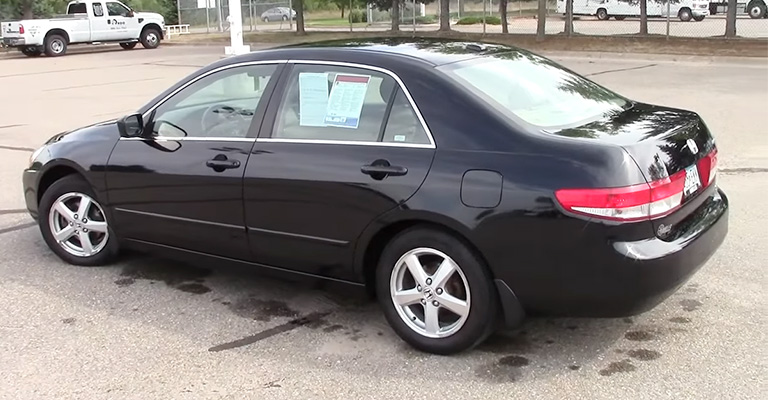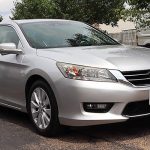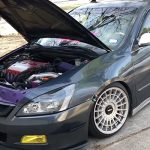The 2004 Honda Accord is a popular and reliable mid-size sedan that has been in production since 1976.
However, like any vehicle, it can experience problems over time. Some common issues reported by owners of 2004 Honda Accords include transmission problems, issues with the electrical system, and problems with the suspension.
It is important to address these issues promptly to avoid further damage and to ensure the safety of the driver and passengers. In this article, we will discuss some of the common problems reported by 2004 Honda Accord owners and provide information on how to troubleshoot and fix these issues.

2004 Honda Accord Problems
1. “No Start” Due to Ignition Switch Failure
This issue occurs when the ignition switch, which is responsible for activating the starter and supplying power to the vehicle’s electrical system, fails to function properly. This can cause the engine to not start, or it may start and then stall unexpectedly.
This issue may be caused by a faulty ignition switch, or it may be the result of a problem with the wiring or another component in the electrical system.
2. Check Engine and D4 Lights Flashing
The Check Engine light is a warning indicator that is displayed when the vehicle’s computer detects a problem with the engine or other components.
The D4 light is a transmission warning indicator that is displayed when there is a problem with the transmission.
If these lights are flashing, it means that there is an issue that needs to be addressed. Some possible causes of this problem include a faulty oxygen sensor, a malfunctioning transmission, or a problem with the fuel system.
3. Radio/Climate Control Display May Go Dark
This issue occurs when the display for the radio or climate control system stops working or becomes difficult to read. This can be caused by a variety of issues, including a problem with the display itself, a problem with the wiring or connections, or a problem with the computer that controls the system.
4. Faulty Door Lock Actuator May Cause Power Door Locks to Activate Intermittently
The door lock actuator is a component that is responsible for activating the power door locks when the lock button is pressed. If the actuator is faulty, it may cause the door locks to activate intermittently, or it may prevent the locks from functioning altogether.
This can be frustrating for the driver and passengers, and it can also make it difficult to securely lock the vehicle.
5. Warped Front Brake Rotors May Cause Vibration When Braking
The brake rotors are the discs that the brake pads clamp onto to create friction, which slows the vehicle down. If the front brake rotors become warped, it can cause a vibration when the brakes are applied.
This can be a result of the rotors being subjected to excessive heat or stress, or it may be caused by a problem with the brake pads or other components in the braking system. Warped rotors can also cause reduced braking performance and increase the risk of a collision.
6. Air Conditioning Blowing Warm Air
If the air conditioning system in a 2004 Honda Accord is blowing warm air instead of cold, it could be due to a variety of issues. One possible cause is a refrigerant leak, which can occur if the air conditioning system has not been properly maintained or if there is a problem with the system’s seals or hoses.
Another potential cause is a malfunctioning compressor, which is responsible for compressing and circulating the refrigerant. A faulty compressor can prevent the air conditioning system from functioning properly, resulting in warm air being blown into the cabin.
7. Front Compliance Bushings May Crack
The compliance bushings are rubber or polyurethane components that are designed to absorb shock and vibration in the suspension system. If these bushings crack or become damaged, it can cause problems with the handling and stability of the vehicle.
In particular, the front compliance bushings may crack due to normal wear and tear, or they may be damaged by potholes or other road hazards. If the front compliance bushings are damaged, it is important to have them replaced as soon as possible to ensure the safety of the vehicle.
8. Porous Engine Block Casting May Cause Engine Oil Leaks
The engine block is the main component of the engine, and it is responsible for containing and supporting the various moving parts. If the engine block is made of porous casting material, it can allow oil to leak out of the engine.
This can be caused by a variety of factors, including the use of low-quality materials or poor manufacturing processes.
Oil leaks can be dangerous because they can cause the engine to overheat or seize up, leading to serious damage. If an oil leak is suspected, it is important to have the vehicle inspected by a mechanic to determine the cause and take appropriate action.
9. Driver’s Door Latch Assembly May Break Internally
The door latch assembly is a component that is responsible for holding the door closed and allowing it to be opened by the handle or key. If the latch assembly breaks internally, it can prevent the door from opening or closing properly.
This can be frustrating and inconvenient, and it may also affect the safety of the vehicle if the door cannot be securely closed.
10. Bad Engine Mounts May Cause Vibration, Roughness, and Rattle
The engine mounts are responsible for securing the engine to the vehicle’s frame and isolating it from road vibrations. If the engine mounts are worn out or damaged, it can cause the engine to vibrate, feel rough, or produce a rattling noise.
This can be caused by normal wear and tear, or it may be the result of a collision or other incident. If the engine mounts are faulty, it is important to have them replaced to ensure the smooth operation of the vehicle.
11. Problems Shifting Into 3rd Gear
Some 2004 Honda Accord owners have reported problems shifting into 3rd gear, which can be caused by a variety of issues. One possible cause is a malfunctioning transmission, which may be the result of wear and tear, a problem with the transmission fluid, or a problem with one of the internal components.
Another potential cause is a problem with the clutch, which is responsible for engaging and disengaging the transmission. If shifting into 3rd gear is difficult or impossible, it is important to have the vehicle inspected by a mechanic to determine the cause and take appropriate action.
12. Bad Rear Hub/Bearing Unit
The hub and bearing unit is a component in the suspension system that is responsible for supporting the weight of the vehicle and allowing the wheels to rotate. If the rear hub/bearing unit is faulty, it can cause problems with the handling and stability of the vehicle, and it may also cause noise or vibration.
This issue may be caused by normal wear and tear, or it may be the result of a collision or other incident.
If the rear hub/bearing unit is suspected to be faulty, it is important to have it inspected and replaced if necessary to ensure the safety of the vehicle.
13. Leaking Gaskets May Allow Water into Tail Light Assembly
The gaskets in a vehicle are responsible for sealing various components and preventing leaks. If a gasket in the tail light assembly becomes damaged or fails, it can allow water to enter the assembly, which can cause problems with the lights or other electrical components.
This issue may be caused by normal wear and tear, or it may be the result of a collision or other incident. If the tail light assembly is leaking, it is important to have it inspected and repaired as soon as possible to prevent further damage.
14. Check Engine Light for Running Rough and Difficulty Starting
If the Check Engine light is illuminated and the vehicle is experiencing problems starting or running rough, it could be due to a variety of issues. Some possible causes include a faulty spark plug, a problem with the fuel system, or a malfunctioning engine control module.
It is important to have the vehicle inspected by a mechanic to determine the cause of the problem and take appropriate action.
15. Check Engine Light Due to Failed Air Fuel Sensor or Oxygen Sensor
The air fuel sensor and oxygen sensor are components in the vehicle’s exhaust system that are responsible for monitoring the air-fuel ratio and the amount of oxygen in the exhaust gases.
If either of these sensors fails or becomes damaged, it can cause the Check Engine light to come on and affect the performance of the vehicle.
Some possible symptoms of a failed air fuel sensor or oxygen sensor include reduced fuel efficiency, poor acceleration, and difficulty starting.
16. Plugged Moon Roof Drains May Cause Water Leak
The moon roof drains are responsible for directing water away from the vehicle’s interior when the moon roof is open.
If the drains become clogged, it can cause water to leak into the vehicle, which can be a nuisance and may also cause damage to the interior.
This issue may be caused by debris or leaves clogging the drains, or it may be the result of a problem with the drain hoses or seals.
If the moon roof is leaking, it is important to have it inspected and repaired to prevent further damage.
17. Transmission solenoid may short-circuit and cause CEL
The transmission solenoid is a component in the transmission system that is responsible for controlling the flow of transmission fluid and shifting gears.
If the solenoid shorts out or becomes damaged, it can cause the Check Engine light to come on and may also affect the performance of the transmission.
Some possible symptoms of a faulty transmission solenoid include difficulty shifting gears, slipping or jerking when shifting, and a burning smell coming from the transmission.
If the transmission solenoid is suspected to be faulty, it is important to have it inspected and replaced if necessary to ensure the proper operation of the transmission.
18. Failed VTEC oil pressure switch
VTEC (Variable Valve Timing and Lift Electronic Control) is a system that is used to optimize engine performance by adjusting the timing and lift of the valves. The VTEC oil pressure switch is responsible for activating the VTEC system and ensuring that it is functioning properly.
If the VTEC oil pressure switch fails or becomes damaged, it can cause the Check Engine light to come on and may also affect the performance of the engine.
Some possible symptoms of a failed VTEC oil pressure switch include reduced fuel efficiency, poor acceleration, and difficulty starting. If the VTEC oil pressure switch is suspected to be faulty, it is important to have it inspected and replaced if necessary to ensure the proper operation of the engine.
Possible Solutions
| Problem | Possible Solutions |
| No start due to ignition switch failure | Replace the ignition switch, check wiring and electrical components |
| Check engine and D4 lights flashing | Check the oxygen sensor, transmission, and fuel system |
| Radio/climate control display goes dark | Check the display, wiring and connections, and computer |
| Faulty door lock actuator | Replace the door lock actuator |
| Warped front brake rotors | Replace the front brake rotors |
| Air conditioning blowing warm air | Check for refrigerant leaks, replace the compressor |
| Front compliance bushings cracking | Replace the front compliance bushings |
| Porous engine block casting causing oil leaks | Repair or replace the engine block |
| Driver’s door latch assembly breaking internally | Replace the door latch assembly |
| Bad engine mounts causing vibration, roughness, and rattle | Replace the engine mounts |
| Problems shifting into 3rd gear | Check the transmission and clutch |
| Bad rear hub/bearing unit | Replace the rear hub/bearing unit |
| Leaking gaskets allowing water into tail light assembly | Repair or replace the gaskets in the tail light assembly |
| Check engine light for running rough and difficulty starting | Check the spark plugs, fuel system, and engine control module |
| Check engine light due to failed air fuel sensor or oxygen sensor | Replace the air fuel sensor or oxygen sensor |
| Plugged moon roof drains causing water leak | Clear the moon roof drains and check the hoses and seals |
| Transmission solenoid short-circuiting and causing CEL | Replace the transmission solenoid |
| Failed VTEC oil pressure switch | Replace the VTEC oil pressure switch |
2004 Honda Accord Recalls
| Recall | Description | Affected Models |
| 19V501000 | Newly replaced passenger air bag inflator ruptures during deployment, spraying metal fragments | 10 models |
| 19V499000 | Newly replaced driver’s air bag inflator ruptures during deployment, spraying metal fragments | 10 models |
| 19V182000 | Driver’s frontal air bag inflator ruptures during deployment, spraying metal fragments | 14 models |
| 18V268000 | Front passenger air bag inflator potentially installed improperly during replacement | 10 models |
| 16V178000 | Passenger frontal air bag does not fully deploy in a crash | 1 model |
| 15V370000 | Front passenger air bag defective | 7 models |
| 15V320000 | Driver’s front air bag defective | 10 models |
| 14V700000 | Front airbag inflator module | 9 models |
| 14V353000 | Front airbag inflator module | 9 models |
| 07V001000 | Problem with seat position sensor | 1 model |
| 04V551000 | Torn air bag | 1 model |
| 04V176000 | Internal transmission fault | 6 models |
| 12V222000 | Potential power steering leak | 2 |
Recall 19V501000:
This recall affects certain 2004-2007 Honda Accord models equipped with a Takata-brand passenger frontal air bag inflator. These inflators may rupture during deployment, spraying metal fragments into the vehicle cabin and potentially causing serious injury or death to the occupants.
Recall 19V499000:
This recall affects certain 2004-2007 Honda Accord models equipped with a Takata-brand driver’s frontal air bag inflator. These inflators may rupture during deployment, spraying metal fragments into the vehicle cabin and potentially causing serious injury or death to the occupants.
Recall 19V182000:
This recall affects certain 2004-2007 Honda Accord models equipped with a Takata-brand driver’s frontal air bag inflator. These inflators may rupture during deployment, spraying metal fragments into the vehicle cabin and potentially causing serious injury or death to the occupants.
Recall 18V268000:
This recall affects certain 2004-2007 Honda Accord models that had their front passenger air bag inflator replaced as part of a previous recall.
These inflators may have been installed improperly, which could cause the air bag to deploy improperly in the event of a crash, increasing the risk of injury to the occupants.
Recall 16V178000:
This recall affects certain 2004 Honda Accord models equipped with a passenger frontal air bag. The air bag may not fully deploy in a crash, potentially reducing the level of protection for the occupants and increasing the risk of injury.
Recall 15V370000:
This recall affects certain 2004-2007 Honda Accord models equipped with a front passenger air bag inflator. These inflators may rupture during deployment, spraying metal fragments into the vehicle cabin and potentially
Problems and Complaints Sources
https://repairpal.com/2004-honda-accord/problems/2
All Honda Accord years we talked –




